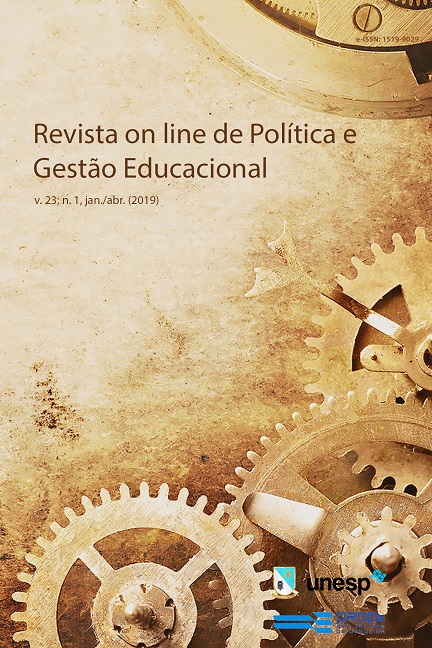Significado formativo y participación democrática: una encuesta sobre la enseñanza de la historia y la literatura
DOI:
https://doi.org/10.22633/rpge.v23i1.12309Palabras clave:
Historia, Literatura, Estudiantes Participación democrática.Resumen
La investigación que aquí se presenta pretende ser parte del debate sobre la importancia de las humanidades y ofrecer su contribución desde un punto de vista educativo. El asunto en cuestión es la enseñanza de las humanidades, en particular la historia y la literatura, aunque se tratan de manera inusual y exploratoria, aunque con un propósito claro: escuchar a los estudiantes para descubrir cómo y en qué medida su voz y su participación íntima en el El tema del estudio puede contribuir a una mayor comprensión del proceso de enseñanza-aprendizaje y a una mejora en términos de efectividad de las prácticas de enseñanza, en referencia específicamente a las dos materias humanísticas que se examinan.
Descargas
Citas
ALTET, M. La ricerca sulle pratiche d’insegnamento in Francia. Brescia: La Scuola, 2003.
ALTET, M. L’analyse de pratiques: retrospective et questions actuelles. Recherche et Formation, 51, p. 11-25, 2006.
BLANCHARD-LAVILLE C.; FABLET D. (Éds.). Analyser les pratiques professionnelles. Paris: L’Harmattan, 2000.
BRU, M. Pratiques enseignantes: des recherches à conforter et à développer. Revue Françoise de Pédagogie, 138, p. 63-73, 2002.
CHARMAZ, K. Grounded Theory: objectivist and constructivist methods. In: DENZIN, N.; LINCOLN, Y. (Eds.). Handbook of Qualitative Research. Thousand Oaks (CA)-London: Sage (II ed.), 2000. p. 506-535.
CHARMAZ, K. Constructing grounded theory. A practical guide through qualitative analysis. London: Sage, 2006.
COOK-SATHER, A. Authorizing Students’ Perspectives: toward trust, dialogue, and change in education. Educational Researcher, v. 31, n. 4, p. 3-14, 2002.
COULON, A. Le métier d’étudiant. L’entrée dans la vie universitarie. Paris: PUF, 1997.
DAMIANO, E. Prove di formalizzazione. I modelli della Nuova Ricerca Didattica. Pedagogia e Vita, 3, p. 21-57, 1998.
DAY, C.; LANEVE, C. (Eds.). Analysis of Educational Practices. A Comparison of Research Models. Brescia: La Scuola, 2011.
DEWEY, J. Le fonti di una scienza dell’educazione. Firenze: La Nuova Italia, 1967, 1929.
FIELDING, M. Students as Radical Agents of Change. Journal of Educational Change, v. 2, n. 3, p. 123-141, 2001.
FIELDING, M. Beyond Student Voice: Patterns of Partnership and the Demands of Deep Democracy. Revista da Educación, 359, p. 45-65, 2012.
GEMMA, C. Scrittura e memoria. La parola allo studente. Trento: Erickson, 2011.
GEMMA, C. Lo sguardo dello studente. Fotogrammi di vita scolastica. Lecce: Pensa Multimedia, 2012.
GEMMA, C. Lo studente: fonte sussidiaria per l’analisi dell’insegnamento. In: GRION, V.; COOK-SATHER, A. (a cura di), Student Voice. Prospettive internazionali e pratiche emergenti in Italia. Milano: Guerini, 2013. p. 155-165.
GEMMA, C.; GRION, V. (a cura di) Student Voice. Pratiche di partecipazione degli studenti e nuove implicazioni educative. Barletta: Cafagna Editore, 2015.
GLASER, B. Theoretical Sensitivity. Mill Valley (CA): Sociology Press, 1978.
GLASER, B. Basics of grounded theory analysis. Mill Valley (CA): Sociology Press, 1992.
GLASER, B. Doing Grounded Theory. Issues and Discussions. Mill Valley (CA): Sociology Press, 1998.
GLASER, B.; STRAUSS A. The discovery of grounded theory: strategies for qualitative research. Chicago-New York: Aldine de Gruyter), 1967.
GRION, V.; COOK-SATHER, A. (a cura di) Student Voice. Prospettive internazionali e pratiche emergenti in Italia. Milano: Guerini Scientifica, 2013.
GUBRIUM, J. F.; HOLSTEIN, J. A. (Eds.). Handbook of interview research. Context and method. Thousand Oaks (CA): Sage, 2001.
KVALE, S. InterViews. An Introduction to Qualitative Research Interviewing. London: Sage, 1996.
LANEVE, C. Analisi della pratica educativa. Metodologia e risultanze della ricerca. Brescia: La Scuola, 2005.
LANEVE, C. (a cura di), Dentro il “fare scuola”. Sguardi plurali sulle pratiche. Brescia: La Scuola, 2010.
LANEVE, C. Manuale di Didattica. Il sapere sull’insegnamento. Brescia: La Scuola (II ed.), 2017.
NUSSBAUM, M. C. Non per profitto. Perché le democrazie hanno bisogno della cultura umanistica. Bologna: il Mulino, 2011-2010.
PERRENOUD, Ph. Métier d’élève et sens du travail scolaire. Paris: Esf (VIII ed. 2013), 1994.
POLANYI, M. La conoscenza inespressa. Roma: Armando, 1966/1979.
SCHÖN, D. A. Il professionista riflessivo. Per una nuova epistemologia della pratica professionale. Bari: Dedalo, 1983/1993.
SMYTH, J. When students have power: student engagement, student voice, and the possibilities for school reform around «dropping out» of school. International Journal of Leadership in Education: Theory and Practice, v. 9, n. 4, p. 285-298, 2006.
STRAUSS, A.; CORBIN, J. Basics of qualitative research: grounded theory procedures and techniques. Newbury Park: Sage (II ed. 1998), 1990.
TAROZZI, M. Che cos’è la grounded theory. Roma: Carocci (rist. 2015), 2008.











